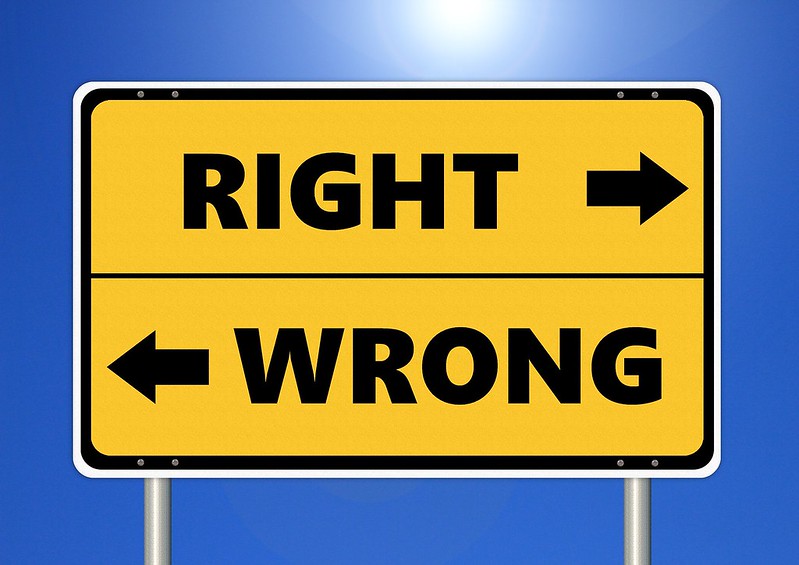
Image Credit: SonnyandSandy
I’m an honest negotiator. You’re an honest negotiator. There’s no way that our sense of what is right and what is wrong would change as we use our negotiation styles and negotiating techniques during the course of a negotiation, right? Well, as you might well imagine, that’s not always the case. If we find ourselves in a tight spot during a negotiation, there will always be the temptation to do the wrong thing. When we find ourselves in a situation like that, how should we deal with it?
Ethics Challenge #1. The Power Of Temptation
So do you ever lie during a negotiation? How about bend the truth just a little bit? It turns out that whether or not negotiators lie depends in part on how lucrative the rewards are. In studies that have been done, it has been shown that when people were promised a bigger reward if they lied, roughly 70% of the time they would lie. It turns out that the higher a reward is, the greater the temptation to lie is. Similarly, the larger the bribe, the more likely we are to take it. It seems our ethical standards may be more fluid than we would like to believe.
Ethics Challenge #2. The Attraction of Uncertainty
It turns out that uncertainty increases the likelihood that we will be unethical. What this means for us is that uncertainty about the material facts in a negotiation can inspire unethical behavior. In studies that have been performed, when negotiators are uncertain about things having to do with their negotiation, uncertain negotiators actually provide more aggressive, less honest estimates.
Ethics Challenge #3. Powerlessness Creates Power
I think that we have all heard the statement “Power tends to corrupt and absolute power corrupts absolutely”. However, in the world of negotiations, a lack of power is more likely to lead us to behave unethically. Consider that outside alternatives to agreement are a strong source of power in negotiation. If we have a lack of outside options then this will increase our negotiator deception.
Ethics Challenge #4. Victims Who Are Anonymous
One very interesting fact that I believe that a lot of us may not be aware of is that we treat a group of people differently that we’d treat one person. Say for example you are going for a new job and your negotiation is with several people—a recruiter, the human-resources manager, the division president, and the director of sales. When negotiating with this group, you’d be more likely to lie than when negotiating with just one person. In a study, participants with a group of opponents lied to them about the amount in the pot 73% of the time; those with individual opponents lied only 36% of the time. So why do we do this? It turns out that negotiators perceive interactions with groups to be less personal than interactions with individuals, a perception that they believe justifies increased unethical behavior when dealing with groups.
What All Of This Means For You
I know that we’d all like to be able to put ourselves up on to a pedestal. We’d like to be able to think of ourselves as good people with a high set of ethical standards. We’d also like to think that these ethical standards guide our actions all the time. However, I think that we’d also have to admit if during a principled negotiation things started to get tough, we would find our ethical standards under a lot of pressure. Do you think that yours would hold up?
Although we’d like to think that during a negotiation we would always be honest, it turns out that if we are presented with a reward that is big enough, most of us could be convinced to lie in order to get the reward. In a negotiation, if things are uncertain, then we’ll be motivated to lie. If we feel that we are lacking power in a negotiation, then once again we’ll be more motivated to start to lie. If we are negotiating with a group of people we will be more likely to lie than if we were negotiation with just one person.
Yes, we’d all like to think of ourselves as having the highest ethical standards. However, life is what it is and we need to understand that we can find ourselves in situations where we’ll be tempted to allow our ethical standards to slide. We need to have an understanding of what situations can cause this to happen and what we are likely to do in these situations. If we can understand both of these, then we have a better chance of not making an ethical mistake.
– Dr. Jim Anderson
Blue Elephant Consulting –
Your Source For Real World Negotiating Skills™
Question For You: Is there any way to avoid getting into a situation where your ethics might be challenged?
P.S.: Free subscriptions to The Accidental Negotiator Newsletter are now available. Learn what you need to know to do the job. Subscribe now: Click Here!
What We’ll Be Talking About Next Time
Let’s all face it: pressure is a part of the negotiating process. We wouldn’t know that we were in the middle of a negotiation if we didn’t feel some pressure on us. The problem with this pressure is that it can cause us to make poor decisions. Negotiators can feel pressured to use their negotiation styles and negotiating techniques to wrap up a deal as quickly as possible. Speed is often the enemy of a sound, lasting deal, but several safeguards can protect you the next time you negotiate in a high pressure situation.
